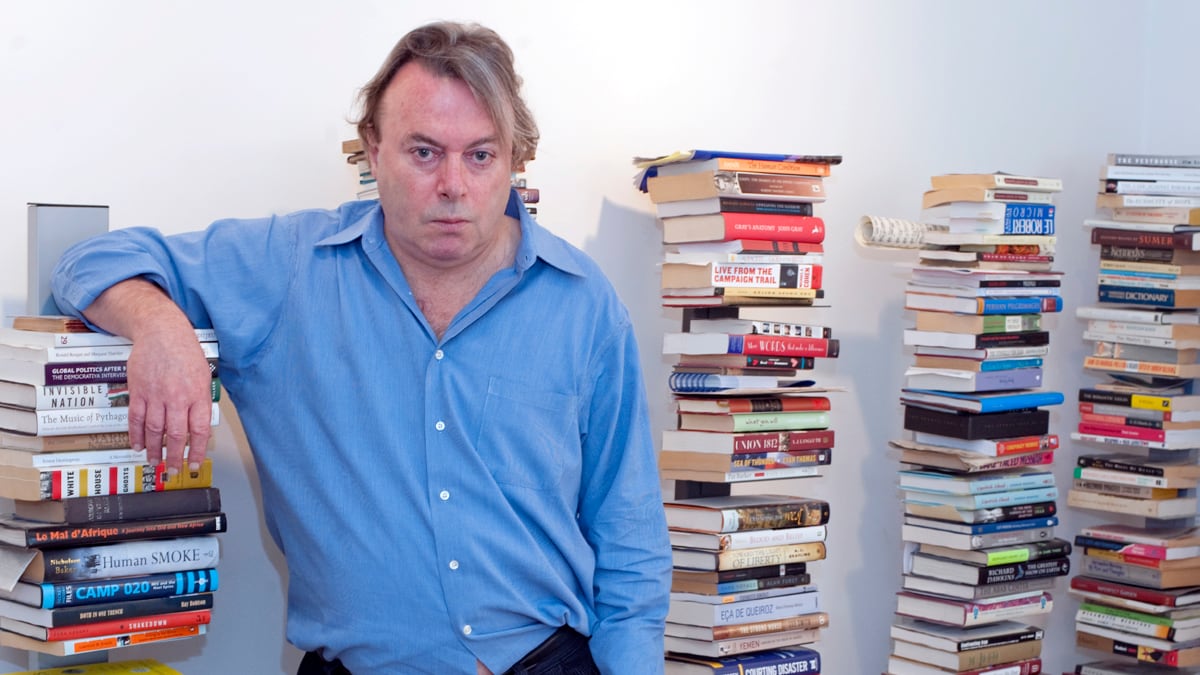Polemicist and journalist Christopher Hitchens, who died in December at 62 after a battle with esophageal cancer, was celebrated Friday as an incorrigible contrarian, dazzling public intellectual, obdurate justice seeker, and passionate bon vivant in a star-studded memorial service at New York’s Cooper Union.
Yet “service,” as in pious activity, is probably the wrong word—for Hitchens was famously an adamant atheist, and his 2007 faith-debunking bestseller God Is Not Great: How Religion Poisons Everything was the most successful of his 12 books and five essay collections.
“Shortly after his death, I was interviewed by an annoying interviewer on CNN,” theoretical physicist Lawrence Krauss told the capacity crowd of around 800, which included many of the leading figures in literature, journalism, science, and entertainment that Hitchens counted as friends, notably Hollywood actors Sean Penn and Olivia Wilde (who confided that Hitchens, a close pal of her parents, “was a wonderful babysitter”).
Krauss went on with his story by saying that the unnamed CNN personality introduced the Hitchens segment thusly: “On the one hand, he inspired the ideals of skepticism, free inquiry, and rational thought, but at the same time has been called a bullying, lying, opportunistic, cynical contrarian. She said that as if it were a bad thing.”
Big laugh from the audience—one of many moments of hilarity throughout the two hours of remembrances by friends and family and readings from Hitchens’s prolific body of work. His writings—often dashed off while he sat on a barstool yet informed by amazing erudition—appeared everywhere from The Nation to Newsweek to Vanity Fair, where he spent more than a decade as a marquee columnist.
Vanity Fair editor Graydon Carter, who organized the event, called Hitchens “a man of ferocious appetites—for Scotch, for cigarettes, and for talk. That he had the output to equal what he consumed was the true miracle of the man.” Carter added, “He wrote fast, frequently without benefit of a second draft or even corrections.” He was “an editor’s dream and he was a reader’s dream,” Carter continued, noting that Hitchens possessed “a legendary memory that held up even under the most liquid of late-night conditions.”

Hitchens’ prodigious drinking and smoking—documented by numerous photographs and a tailor-made documentary projected behind the stage—was a leitmotif of the memorial, as was his insistence on leaving “the cozy cocoon of conventional liberal wisdom,” as Carter put it, to back George W. Bush’s war in Iraq, savage the sainted Mother Teresa as a fraud and hypocrite, and pursue Henry Kissinger as an evil war criminal. Richard Nixon’s former national security adviser and secretary of state, generally one of the more sought-after eulogists whenever a VIP passes away, was understandably not in attendance.
Sitting in the invited audience, however, were media mogul Tom Freston, writer and director Nora Ephron, 60 Minutes correspondent Steve Kroft, New Yorker editor David Remnick, Newsweek and The Daily Beast editor Tina Brown, and London lawyer Eleni Meleagrou, Hitchens’ ex-wife and the mother of two of his three children, Alexander and Sophia. Carol Blue, his widow and the mother of his daughter Antonia, joined his son Alexander Meleagrou-Hitchens in reading excerpts from his writing.
Among others who read from Hitchens’s work were playwright Tom Stoppard, novelist Salman Rushdie, and satirist and novelist Christopher Buckley, along with Penn and Wilde. Geneticist Francis Collins, director of the National Institutes of Health, who helped guide Hitchens’s cancer treatment, played a piano piece that he composed in honor of the writer after noting that they became warm friends even though “I am a follower of Jesus Christ.”
Eulogist Martin Amis, the famed novelist and Hitchens’s close friend since their Oxford days, cheekily recalled that his pal was a “self-mythologizer” who “often referred to himself in the third person,” as in “The Hitch.” Whenever an injustice occurred, Hitchens would declare, “The pen of the Hitch will flash from its scabbard.” Once, when they were strolling toward a movie theater in Southampton, N.Y., Amis teased his friend that “no one has recognized The Hitch for at least 10 minutes,” Amis recounted. “And he said, ‘Longer. It’s been at least 15 minutes.’”
British actor and playwright Stephen Fry, memorializing Hitch the hedonist, recalled that he maintained that “the most overrated things in life were champagne, lobster, anal sex, and picnics.” Fry, who is out and proud, waited a beat before adding, “Well, three out of four!”
It would have tickled Hitchens that his memorial started and ended with a rousing recording of “The Internationale,” and it probably wouldn't have bothered him excessively that afterward, once the mourners were outside on the sidewalk, clouds of cigarette smoke wafted over their heads.






